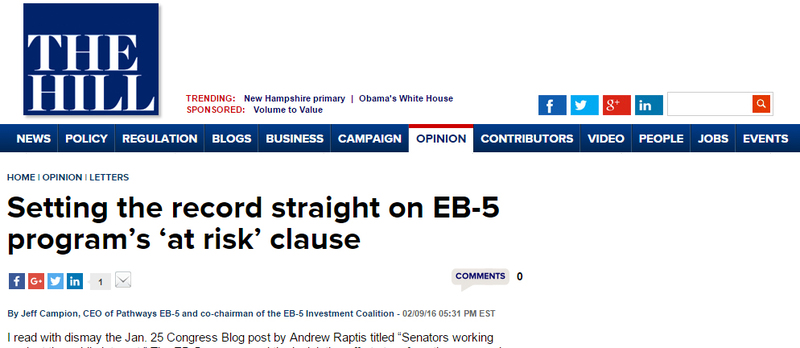I read with dismay the Jan. 25 Congress Blog post by Andrew Raptis titled “Senators working against the public interest.” The EB-5 program and the legislative efforts to reform the program have been so misinterpreted in the press and media, we felt it important to try to set the record straight.
The author not only gets the substance wrong but also the process. The municipal bond provision in the EB-5 Integrity Act of 2015, S. 2415, is not a new provision. Its genesis is from five different versions of S. 1501, the American Job Creation and Investment Promotion Reform Act of 2015, and was added to the EB-5 reform package and supported by Senate Judiciary Committee Chairman Chuck Grassley (R-Iowa), ranking member Patrick Leahy (D-Vt.), House Judiciary Committee Chairman Bob Goodlatte (R-Va.) and ranking member John Conyers (D-N.Y.). This was seen as a necessary integrity measure and was added, from what we understand, by the original drafters to protect the integrity of the EB-5 investment and be certain that the investment was actually “at risk” as required by statute.
There was a concern by the original drafters that investors were able to invest money that would essentially be guaranteed to be returned without the requisite risk. The “at risk” requirement is designed to ensure that an investor is actually investing in the U.S. rather than simply loaning money that will be returned at a later date. An investor must be willing to place all the investor’s funds at risk — including risk of loss. If the investor’s return is guaranteed, such as through a municipal bond, it could give the appearance of buying an EB-5 visa.
There was no intent to steer funds away from municipal/state or public-private partnerships; it was merely to preserve the underlying integrity of the program’s “at risk” requirement. We are aware of several EB-5 projects that are municipal/state or public-private partnerships as well as infrastructure. Should the author of the blog wish to pursue his inquiry further, we suggest he consult with Sens. Grassley and Leahy.
Enact strong disclosure rules for corporations' political spending
Six years after the Citizens United Supreme Court decision enabled a flood of money in politics, a number of high-profile Democratic senators recently reiterated the need for a Securities and Exchange Commission (SEC) rule that would require disclosure of corporate political spending (“Dems renew call for political spending disclosure rule,” Jan. 21).
The senators’ push for action echoes the widespread belief among the American public that action is needed to strengthen political spending disclosure. Individuals sent in a record 1.2 million comments to the SEC in support of the proposed rule. This reflects a September 2015 Public Policy Polling survey in which the vast majority of respondents agreed that outside groups should be required to reveal the sources of their political spending.
This support comes from both sides of the aisle. The same survey showed that an even 88 percent of both Democrats and Republicans agreed on the necessity for the SEC to implement the proposed rule. Given the overwhelming bipartisan consensus on this issue, it is disappointing that congressional Republicans have not joined in calls for reform.
It is time for all our elected officials to show leadership on a measure that most Americans believe is critical in order to defend our democracy.
Mentions
States
- New York
Securities Disclaimer
This website is for informational purposes only and does not constitute an offer or solicitation to sell shares or securities. Any such offer or solicitation will be made only by means of an investment's confidential Offering Memorandum and in accordance with the terms of all applicable securities and other laws. This website does not constitute or form part of, and should not be construed as, any offer for sale or subscription of, or any invitation to offer to buy or subscribe for, any securities, nor should it or any part of it form the basis of, or be relied on in any connection with, any contract or commitment whatsoever. EB5Projects.com LLC and its affiliates expressly disclaim any and all responsibility for any direct or consequential loss or damage of any kind whatsoever arising directly or indirectly from: (i) reliance on any information contained in the website, (ii) any error, omission or inaccuracy in any such information or (iii) any action resulting therefrom.




